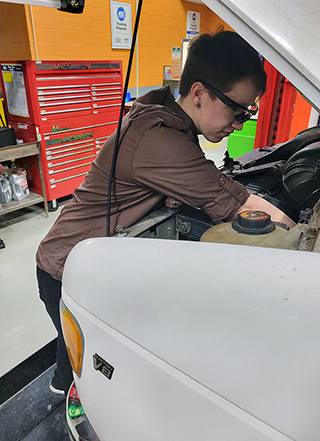Women in Male-Dominated Fields: Amy Lugo
Army Spc. Amy Lugo, thinking about post-military life, is plotting a course for a career in the automotive industry.
Male-dominated fields are those that have 25% or fewer women in the ranks. That's according to Catalyst, a global organization dedicated to guiding companies to build workplaces that work for women.
Catalyst also indicates that women comprise almost half the nation's labor force but represent slightly over one-quarter of the automotive workforce. In 2020, women were 9.0% of automotive repair and maintenance employees.
Amy Lugo is not deterred. She is pursuing an automotive technology degree at Thomas Nelson (becoming Virginia Peninsula Community College) and may one day enter the field. Lugo takes evening classes several days a week after full-time duty as a motor transport operator in the Army.
She enlisted in 2019, ranks as a specialist (E-4), and is positioning herself for life after the military. A Michigan native who grew up in North Carolina and Florida, Lugo attended the College of Central Florida for a short time while considering a teaching career. When the military sent her to Virginia's Fort Eustis in 2020, she decided to take another shot at higher education the following year.
Lugo admitted she made the natural choice after majoring in political science briefly and changing majors a few more times.
"I grew up around the automotive industry. My dad did a lot of bodywork, but he didn't teach me a lot. Once I turned18 I needed a job, and a guy took a chance on me. So, I started in parts work. Since I found out I'm good at it, I stuck with it," said Lugo.
The knowledge she is receiving in the automotive program is quite different from that of her experience working in parts.
"I dealt strictly in parts and did not work on things. This is getting my hands on to what I am dealing with," she emphasized.
Lugo is now learning "the actual details of things" instead of mere concepts. The associate of applied science curriculum has introduced her to the basics of vehicle repair and new trends in automotive technology, including advances in hybrid technology and alternative fuel systems. Anti-pollution, hybrids, drivability, tune-ups, and electricity are a few areas her classes have explored to date. 
She is also getting on track for certification by the National Institute of Automotive Service Excellence (ASE). Individuals who have completed an automotive repair training program take the ASE exam to ensure they know how to work on mechanical, electrical and other automotive systems. ASE-certified professionals work in every part of the transportation industry.
Excited by the prospect of becoming ASE-certified, Lugo acknowledged that balancing her military duties, classes, marriage and other responsibilities is grueling.
"My day starts at 5 a.m., and sometimes I'm here until like 9:30 p.m. Being able to make it here and retain information so I can learn more about the industry is rough," said Lugo, pointing to her husband, Dante, as her greatest supporter and emphasizing that it's not all work and no play for her as she enjoys outdoor activities when time permits.
She participated in the College's Veterans Day 5K on campus and is looking forward to an upcoming 10K run on post.
As if that were not enough, Lugo is taking an online course, anatomy of funeral services, at Tidewater Community College. Managing it all is quite the feat.
"It takes up a lot of time, mostly for studying and then I usually have quizzes weekly. Since I have an auto class on Monday nights, I take those quizzes after. Studying is usually before quizzes, or whenever I have free time like Friday nights or weekends. I never have enough hours in my day," she exclaimed.
Her college studies and the rigorous schedule they bring comprise Lugo's strategic plan to ensure her career readiness for the civilian workforce if she decides against a long military career.
"It's pretty much if I change my job, I'll have more experience and that will make it easier for me in the long run. I'm getting ahead of a lot of people by doing the things I'm doing," said Lugo.
"I wouldn't recommend this ... but I took the challenge because it's something I want to do and I'm sticking to it. It takes a lot of effort … a lot of planning, especially food planning. I have to find time to eat, sleep, spend time with my husband, do chores ... anything I need to do extra for work. It takes a lot of caffeine," she added jokingly.
Looking ahead, Lugo realizes other challenges will come. Sexism is one she expects, having already worked in the male-dominated automotive industry as a young adult.
"Not every place is that way. I have had women who refused for me to do basic tasks for them and waited like two hours for a male. I would always have to prove more than a man would," she noted. "It is more common now to see women in the automotive industry, but it depends on where you go."
She said factors such as the type of community and the kind of automotive shop (parts, maintenance, body repair, etc.) determine the level of sexism that might exist.
At any rate, Lugo counts perceived hurdles as motivation navigating in the traditionally male realm. In addition to taking advantage of all the available education and training, Lugo has one more plan.
"I am filing for a full name change to something gender-neutral just to get advantages in the job market," she noted, saying based on names alone, most women do not even get interviews in the field. "It's just taking extra steps that I shouldn't have to compared to someone else."
"At the end of the day, it is your skill ... your hands doing this action, not your gender," she concluded.
